Coming to Vancouver from a small town in Alberta helped Glenn Tkach come out.
“It was moving to Vancouver 25 years ago that helped nudge me out of the closet,” said Tkach. “This city helped me find my way out.”
Tkach wanted to pay that gratitude forward. The result is his “Really Gay History Tour,” or what he describes as an adventure through the rich and tragic history of queer Vancouver.
One of many walking tours offered by Forbidden Vancouver for which Tkach works as a tour guide, it’s a three-hour walk along Robson Square, Granville Street, the West End and Davie Village that runs every Sunday except the winter months.
For Tkach, wearing a bubblegum-pink fedora and a hot pink messenger bag at the corner of West Georgia and Granville as he prepares for a recent tour, it’s a deeply felt passion.
“I found a way to make a career out of being a storyteller and being gay.”
Tkach spent a year preparing and researching the tour for its debut in 2018. He relied heavily on the B.C. Gay and Lesbian Archives, a treasure trove of Vancouver’s queer history started by archivist Ron Dutton during the 1970s.
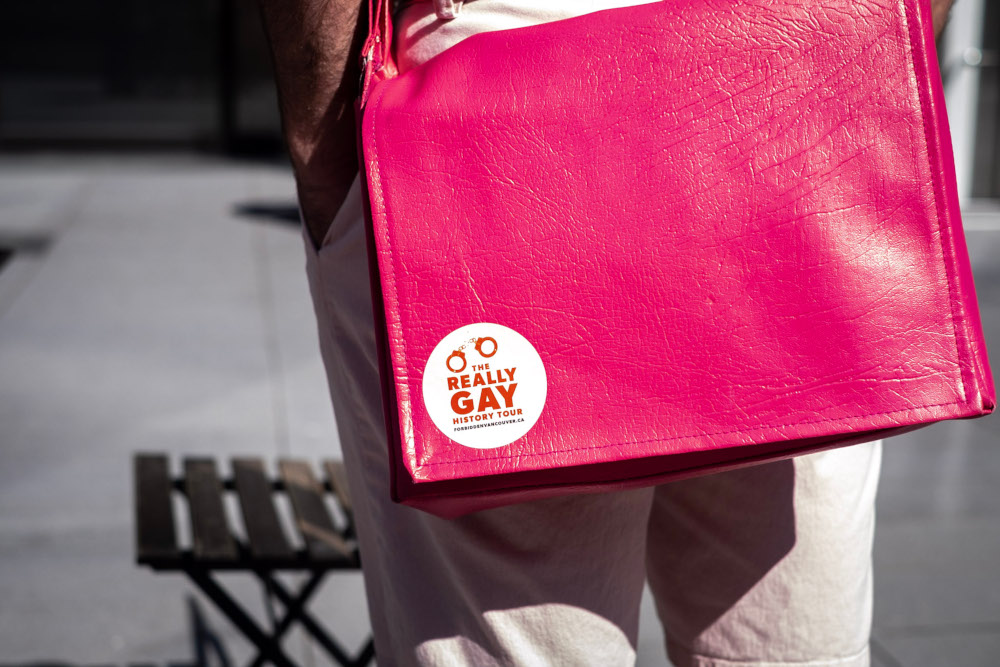
Tkach combed through the archivist’s “hundreds of thousands of materials” to finalize his research before Dutton donated his collection to the City of Vancouver last year.
“I was very lucky to have that resource, because not every city has a Ron Dutton. So that was incredibly helpful, both in its materials but also in helping to point me in the right direction. It gave me some clues about where else I could dig,” Tkach said.
He dug through old newspaper clips, journals, court transcripts, police records and arrest sheets. But documents weren’t his only resource. Tkach turned to paper and people to ensure that queer histories wouldn’t be lost or “sitting in their brains.”
He wanted to ensure the walking tour was inclusive of all queer history. The histories of cis, gay, white men were not going to be the focus, he said.
“I wanted to hit gender diversity. I wanted to hit income diversity. I wanted to hit racial diversity, and those things have been encompassed within the tour.”
Tkach is proud that he included voices from each letter of the LGBTQ2+ community. Some stories include the lives of trans folk, Indigenous two-spirit peoples, lesbian activists, and Vancouver’s formal introduction to drag at the Commodore Ballroom.
‘Stories that needed to be told’
One goal of the tour is to give locals and tourists a deeper understanding of Vancouver, its queer community and its history that was “repressed and actively erased.”
The empty lot at the corner of Davie and Thurlow holds one of these stories. Up until six months ago, Tkach said a “dilapidated old wooden building” once stood in place.
This building had two floors: on the main floor was a Korean restaurant called Ribs, and above it was Little Sisters. The bookstore opened in 1983 by Bruce Smyth and his partner Jim Deva.
“They were the first queer bookstore in Western Canada, and only one of two in all of Canada,” said Tkach.
Little Sisters was a place for members of the LGBTQ2+ community to discuss the happenings during the AIDS epidemic.
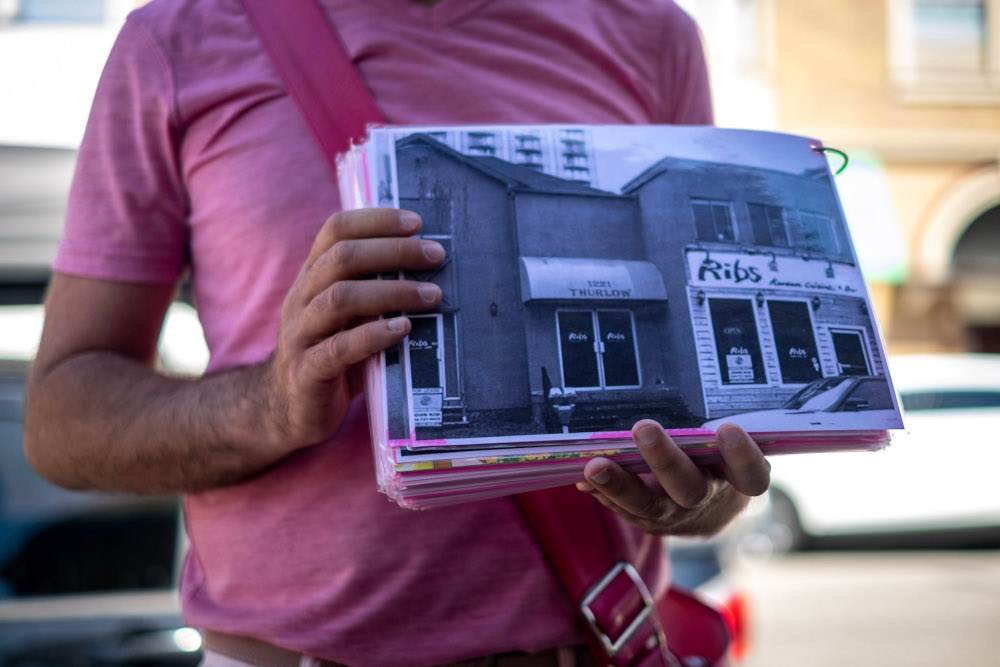
But 1985 would mark the beginning of the legal and physical attacks Little Sisters’ would face. That year, Customs Canada seized a lesbian magazine called Bad Attitude. A year and a half later, they would seize another 69 titles.
“Some of these could be found in other bookstores and even on the shelves of the public library. It was only Little Sisters that was being denied the right to sell them. So, this was clear discrimination.”
Then, Tkach said, the whole thing blew up — literally.
“A bomb was thrown into that bookstore in December 1987, right into the stairwell. The bomb did a lot of damage, thousands of dollars’ worth of damage.”
Tkach said that although no one was hurt, the bombing sent a shockwave throughout the community “because a lot of bomb... and death threats were being made to queer community centres and gay bars.”
Little Sisters has survived decades of oppression and since relocated to the main stretch of Davie Street.
‘A history of all of us’
Through the tour, Tkach has met a diverse range of people that also helped grow it.
“There’s been one major stop I’ve added,” he said. “That’s a result of something I learned from someone on tour, [but] I’m not going to give it away now.”
Members and supporters of the LGBTQ2+ community are not the only ones taking the tour. City locals and tourists who want to learn about the city’s queer history often book spots. Tkach remembered an elderly couple from the Downtown Eastside who signed up.
“As far as I was able to gather, they were just on this tour because they understood it to be a historical tour. They wanted to learn about history.”
Tkach was excited to see the diverse range of people — straight and queer, young and old — taking the tour and offering positive feedback.
“This is the history of a whole society that has become more tolerant of the diversity within it — and not just diverse people within that society — but a whole society that has grown to understand that every single one of us is diverse and has become more free to accept that. So this is an everybody history tour.”
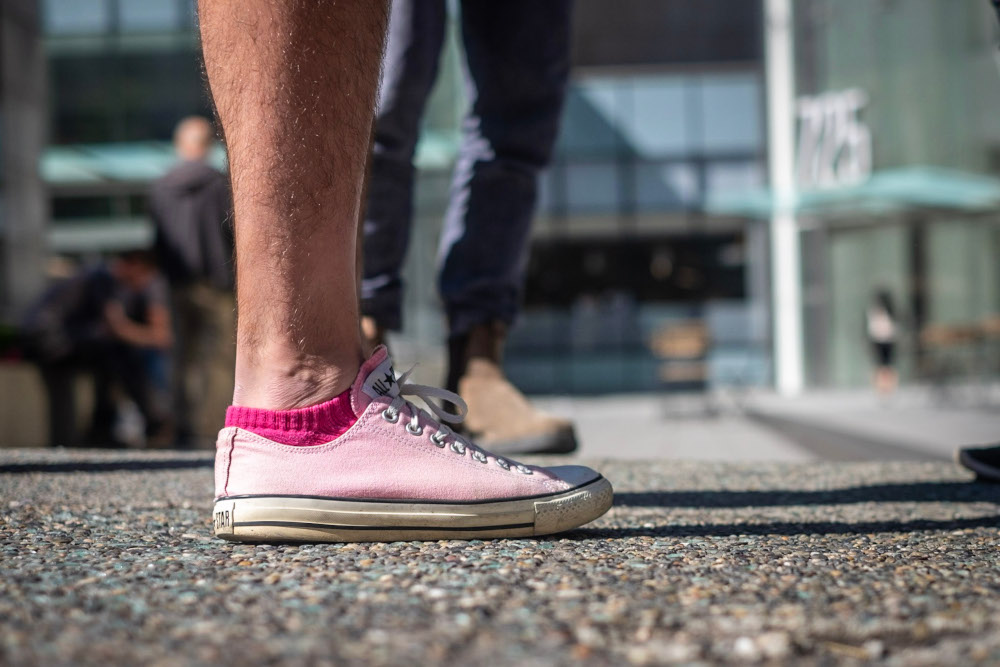
For some people, Tkach’s walking tour is more than just a history lesson. It’s part of their own story.
Tkach recalled one man sharing a deeply personal experience of being forced to go through conversion therapy as a teenager. He said his traumatizing story moved the tour group to tears.
“There’s something about this tour that it touches such a nerve. It’s so close to home for so many people,” he said. “And for lots of people, it’s a lived experience. It’s affected people that we know, it’s affected people who are still alive right now. It affects all of us.”
At the end of one of his tours, Tkach said, a lesbian teenager burst into tears and hugged him to thank him for gathering queer history and making it accessible to the public.
“She felt like it was so powerful to be able to understand the history and the lineage that she came from,” he said. “She thought it was so beautiful that I had gathered these stories that I had — well, the way she put it is that ‘you would listen to your elders, and they pass these stories on to you, and you’re passing them on to me.’ It just meant so much to her.”
While the tour covers the tragedies of the community’s history, Tkach said the tour’s overriding theme is celebratory. It’s also a process of healing, he said. “I think the tour itself is the healing act. It ends in the present day, which is kind of an optimistic and hopeful time to be alive.”
Tkach compares the tour to a mini Pride parade — celebrating queer history with “all of the bumps and bruises that are on it.”
And much like the path to equality, the route on Tkach’s tour is far from linear. He wanted the tour to simulate an adventure.
“It was important for me to be able to craft a route that doesn’t just go in a straight line up Granville, and then on a straight line down Davie,” he said. “It does zigzag around a bit. It’s not very straight, fittingly enough.” ![]()
Read more: Gender + Sexuality, Media


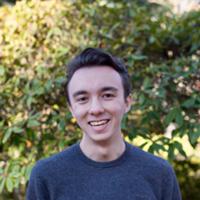
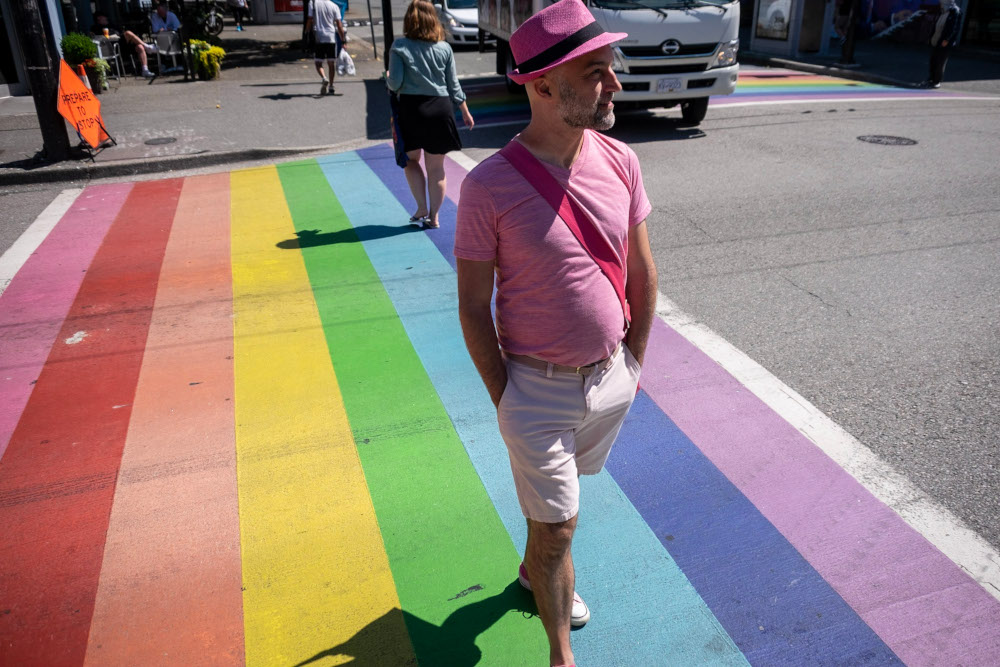












Tyee Commenting Guidelines
Comments that violate guidelines risk being deleted, and violations may result in a temporary or permanent user ban. Maintain the spirit of good conversation to stay in the discussion.
*Please note The Tyee is not a forum for spreading misinformation about COVID-19, denying its existence or minimizing its risk to public health.
Do:
Do not: